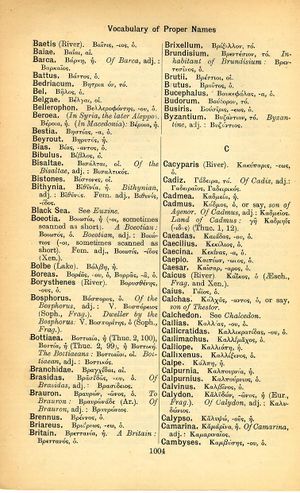Caesar
ὦ δυσπάλαιστον γῆρας, ὡς μισῶ σ' ἔχων, μισῶ δ' ὅσοι χρῄζουσιν ἐκτείνειν βίον, βρωτοῖσι καὶ ποτοῖσι καὶ μαγεύμασι παρεκτρέποντες ὀχετὸν ὥστε μὴ θανεῖν: οὓς χρῆν, ἐπειδὰν μηδὲν ὠφελῶσι γῆν, θανόντας ἔρρειν κἀκποδὼν εἶναι νέοις → Old age, resistless foe, how do I loathe your presence! Them too I loathe, whoever desire to lengthen out the span of life, seeking to turn the tide of death aside by food and drink and magic spells; those whom death should take away to leave the young their place, when they no more can benefit the world
English > Greek (Woodhouse)
Καῖσαρ, -αρος, ὁ.
Latin > English (Lewis & Short)
Caesar: ăris (CAESERIS, C. I. L. 4, 2308; Inscr. Orell. 4205: CAESARVS, C. I. L. 1, 696), m., = Καῖσαρ [a caeso matris utero, Plin. 7, 9, 7, § 47; cf. Non. p. 556, 32:
I a caesarie dictus, qui scilicet cum caesarie natus est, Fest. p. 44; cf. Comment. p. 383. Both etymm. also in Isid. Orig. 9, 3, 12, and Spart. Ael. Ver. 2. Better acc. to Doed. Syn. III. p. 17, from caesius, caeruleus, the color of the skin; cf. Rufus, a cognomen in the gens Julia. Of these the most celebrated, C.Julius Caesar, distinguished as general, orator, statesman, and author, was assassinated by Brutus and Cassius, B.C. 44. After him all the emperors bore the name Caesar, with the title Augustus, until, under Adrian, this difference arose: Augustus designated the ruling emperor; Caesar, the heir to the throne, the crown-prince, etc., Spart. Ael. Ver. 1, § 2; Aur. Vict. Caes. 13, § 12.—
II Derivv.
A Caesărīnus, a, um, adj., of or relating to the triumvir Julius Cœsar, Cœsarian: celeritas, Cic. Att. 16, 10, 1 Orell. N.cr.—
B Caesărĭānus, a, um, adj.
1 Of the triumvir Cœsar, Cœsarian: bellum civile, Nep. Att. 7, 1.— Hence, Caesărĭāni, ōrum, m., the adherents of Cœsar in the civil war (as Pompeiani, his opponents), Hirt. B. Afr. 13: orationes, orations of Cicero in which Cœsar was praised (pro Marcello, Deiotaro, De Provinciis Consularibus, etc.), Serv. ad Verg. G. 2, 131.—
2 Imperial, Vop. Carin. init.: Pallas (esp. honored by Domitian), Mart. 8, 1.—Hence, subst.
a Caesărĭāni, ōrum, m.
(a) A class of provincial imperial officers, Cod. Just. 10, 1, 5; 10, 1, 7; Cod. Th. 10, 7.—
(b) Partisans of Cœsar, Auct. B. Afr. 13; Flor. 4, 3.—
b Caesărĭānum, i, n., a kind of eye-salve, Cels. 6, 6, n. 27.—
C Caesă-rĕus, a, um, adj.
1 Of or pertaining to the triumvir Cœsar, Cœsarian (mostly poet.): sanguis, Ov. M. 1, 201: Penates, id. ib. 15, 864: Vesta, id. ib. 15, 865: forum, founded by him, Stat. S. 1, 1, 85.—
2 Imperial: amphitheatrum, built by the emperor Domitian, Mart. Spect. 1, 7: leones, presented by Domitian in the fight of wild beasts, id. Epigr. 1, 7, 3.
Latin > French (Gaffiot 2016)
(2) Cæsăr,⁵ ăris, m., nom de famille dans la gens Julia ; dont le personnage le plus important fut Jules César

